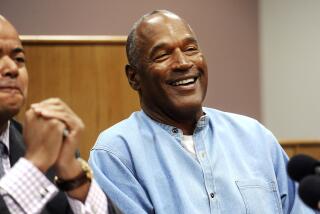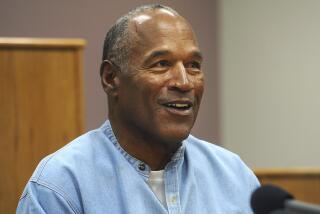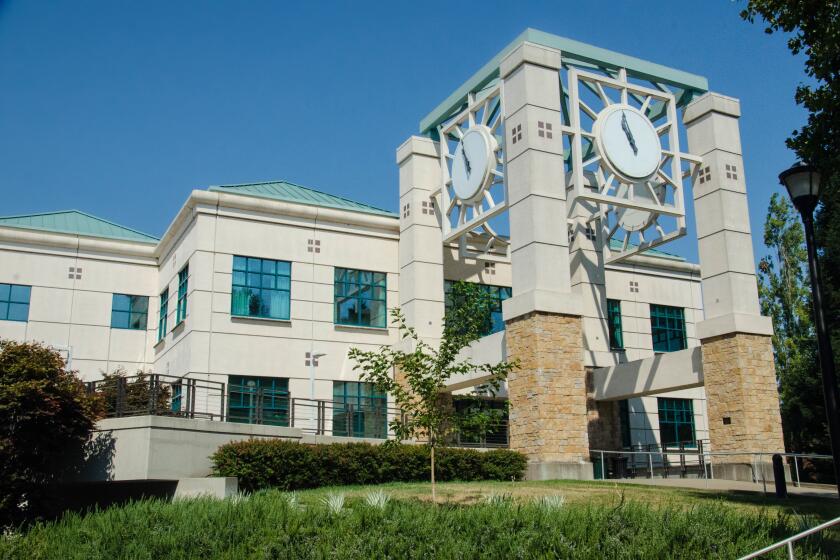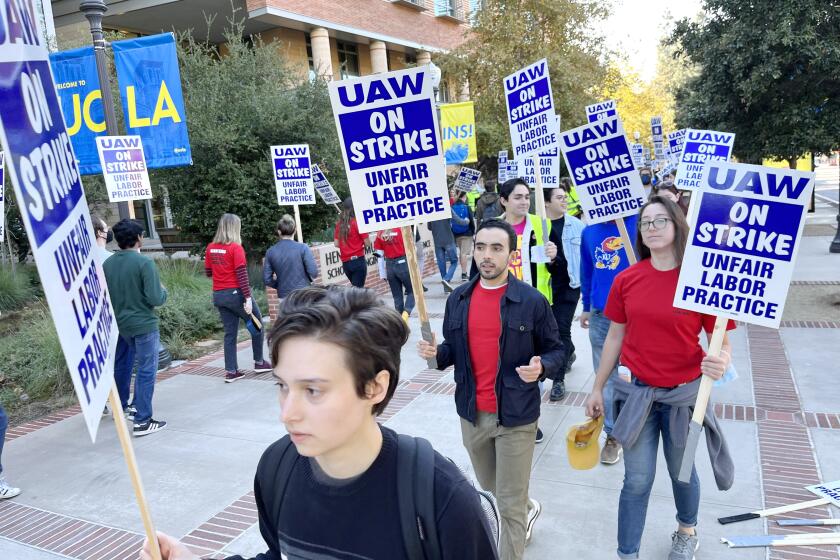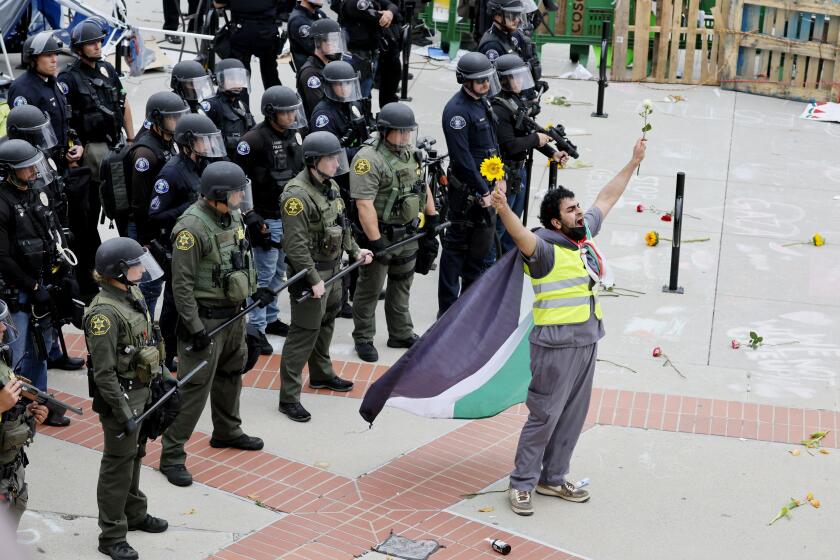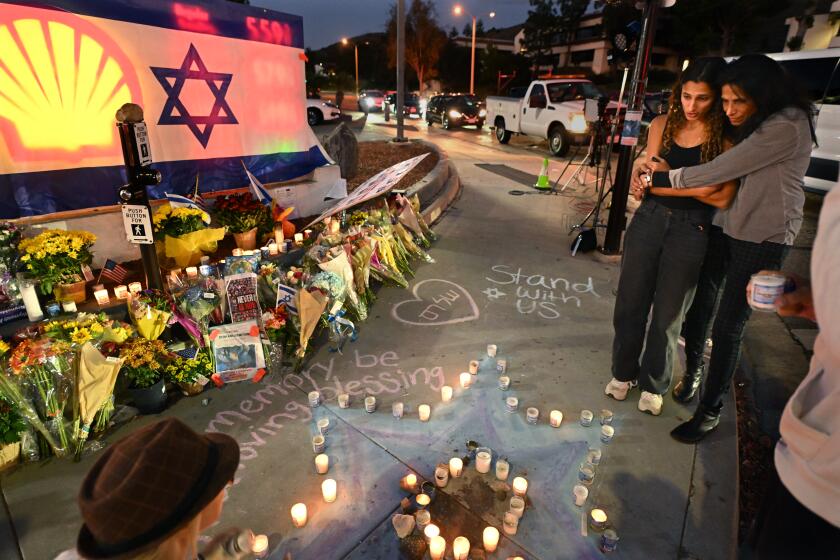D.A. Can Begin DNA Tests in Simpson Case : Courts: Genetic fingerprinting may start Thursday. Ruling on defense use of blood samples is delayed.
After a contentious three-hour session before a new judge, prosecutors in the O.J. Simpson murder case won the right Monday to begin subjecting blood samples to DNA tests that may be able to show whether Simpson was at the murder scene and whether any of the victims’ blood ended up at his estate.
Superior Court Judge Lance A. Ito, presiding over the case for the first time, attempted to broker a compromise allowing prosecutors to conduct the tests but forcing the government lawyers to give Simpson’s attorneys as many samples as possible so their experts can independently conduct tests.
Each side is trying to establish the source of bloodstains found near the bodies of Nicole Brown Simpson and Ronald Lyle Goldman on June 13, as well as other stains discovered in and around Simpson’s Brentwood mansion.
But Ito’s proposed compromise met with resistance from both sides--Simpson’s lawyers would not pledge to share the results of their tests with the district attorney’s office, and prosecutors would not agree to turn over a portion of their samples without that promise.
Barry Scheck, a New York lawyer who is working with the defense team on DNA issues, said Simpson’s lawyers could not ethically promise to share any of their test results with the prosecution--especially without knowing what the tests would reveal. But without such a promise, Deputy Dist. Atty. Marcia Clark said the judge would be “taking away prosecution evidence and giving it to the defense to be hidden if it doesn’t like the results.”
Faced with those sharply divergent views, Ito said government experts could begin conducting their tests Thursday. Ito also ruled that a defense expert can attend the testing and can cut off 10% of each sample, which will be preserved for possible further testing.
Before deciding how those slivers should be handled, Ito said he wanted to hear expert testimony on how much blood is needed to conduct various kinds of DNA tests.
“Since I sense that this is the critical physical evidence,” Ito said, “I need to be clear on what we’re doing here.”
Legal experts echoed Ito’s view of the importance of the DNA evidence and predicted that Monday’s hearing presages more sharp disputes about the tests as the case moves forward.
Monday’s session, said Southwestern University law professor Myrna Raeder, was “an initial skirmish in a much larger DNA war.”
The hearing also was the first since Ito was assigned last week to preside, and the judge appeared calm and relaxed as he oversaw a sometimes highly technical debate. He joked that even a political science major such as himself could see the implications of certain DNA testing issues. He gently chided lawyers for failing to give him the information he needed to craft a ruling on how to split samples in a way fair to both sides.
“Neither side is helping me very much,” Ito complained to the battery of attorneys seated at the defense and prosecution tables.
Under California law, the defense has the right to conduct its own tests if there is enough material left over after the prosecution has completed its analysis. But Clark said government experts would not know how much material was needed until after they had begun testing. By that time, it might be too late to split up some samples for the defense, Simpson’s lawyers countered.
Ito struggled with that quandary, ruling in favor of the defense, only to reverse field after Clark complained that he was “taking evidence out of our hands forever.”
Stuck with complex questions and the shortage of information to decide them, Ito wondered aloud at one point whether the issue wasn’t a “Yossarian situation.” Lawyers looked at him quizzically until he added, “You know, ‘Catch 22,’ ” referring to the Joseph Heller novel and its principal character, a military pilot who wants to avoid flying bombing missions but who can only avoid them by claiming that he is insane. That claim makes so much sense it validates his sanity, forcing him to keep flying.
As with previous hearings, Monday’s was testy and hotly contested, with Clark and lead Simpson lawyer Robert L. Shapiro trading barbs early and often. Simpson, who took notes on a yellow legal pad and chatted with his lawyers during the breaks, nodded as Shapiro accused prosecutors of hypocrisy when Clark asserted that they were engaged in a “search for the truth,” not merely an effort to convict the football superstar.
“I think their presentation is hypocritical at best,” Shapiro said.
Clark retorted that Simpson attorneys were misrepresenting the testing procedures.
“That’s false,” she said in response to one claim by Shapiro. “I don’t know what Mr. Shapiro is talking about. That is not the case.”
The sharp exchanges in part reflect the paramount importance that both sides attach to the DNA tests. Results from those tests can establish with great precision the source of blood or tissue samples, and the results in this case could form a major bulwark of either the prosecution or defense cases.
Under study are a number of blood samples--droplets found leading away from the murder scene, stains on a glove found outside Simpson’s Brentwood estate, and more stains found on his car, in his driveway and inside his home. Conventional blood testing on a droplet discovered at the murder scene ruled out 99.57% of the population as possible sources, but left Simpson in the 0.43% of the population that could have left it, a police expert testified during the preliminary hearing.
But even such a small percentage still means that tens of thousands of Southern California residents could be in the group whose blood would match that sample, so prosecutors are ordering more precise DNA tests. If the DNA tests continue to point to Simpson, they would provide powerful evidence against him, but if they show that his blood does not match the droplets, a crucial component of the prosecution case would disappear.
Similarly, investigators are eager to determine whether any blood on a glove found outside Simpson’s home matches that of either victim or whether other bloodstains at his home or in his car could have come from them.
Monday’s hearing was televised live, and legal experts said both sides appeared to be playing to the public as well as the judge.
As he has in previous hearings, Shapiro insisted that Simpson’s team wanted nothing more than “equal access to all the evidence,” while Clark repeatedly stressed the prosecution’s desire to share as much evidence as possible with the defense. Clark described a “very generous offer” to allow Simpson’s experts to test samples themselves, a gambit that forced the defense attorneys to decline because the offer came with strings attached--namely that prosecutors demanded access to any test results performed by the defense experts.
“Clark put the defense in a bad position” with that offer, said Los Angeles defense attorney Andrew Stein. “That was a very good tactical move. . . . The public may be asking: Why won’t the defense share their results?’ ”
The answer, according to Stein and other experienced lawyers, is that defense attorneys cannot promise to provide information that may prove harmful to their client: To do so would violate their ethical responsibilities. But that issue is a subtle one and may be lost on much of the public, legal experts said.
Defense lawyers, by contrast, won the right to have their own expert cut up blood samples so that a portion can be preserved for them. In a rare move, prosecutors said the defense expert, Dr. Edward Blake, was so well respected that he could be trusted to perform the procedure himself, rather than merely observing while a government-hired expert carried it out.
Simpson and the attorneys are expected to be back in court Friday, when the judge will consider a motion by Shapiro to force the government to turn over information that he says will help establish his client’s innocence.
Ito still has not set a trial date for the case, but Shapiro reiterated Monday that he was unwilling to waive time so that pretrial issues could be discussed. If Shapiro and Simpson’s other lawyers insist on having the trial at the earliest possible opportunity, it could begin Sept. 20.
Simpson has attended all the hearings in the case thus far. Although he did not speak during Monday’s session, he huddled frequently with Johnnie L. Cochran Jr., a well-known attorney who is the latest addition to Simpson’s legal team.
As the session ended, a spectator yelled out: “Good luck, O.J!”
Simpson smiled and quietly responded: “Thank you.”
* BLOOD ANALYSIS: Amount available for testing is crucial, experts say. A17
More to Read
Start your day right
Sign up for Essential California for news, features and recommendations from the L.A. Times and beyond in your inbox six days a week.
You may occasionally receive promotional content from the Los Angeles Times.
